
Digital Interfaces
8000-Series Data Modules
The 8400B Plus data module is a
Asynchronous Data Unit
The asynchronous data unit offers an economic alternative to data modules for connecting Electronic Industries Association
The multiple asynchronous data unit is a circuit board that contains eight asyn- chronous data unit circuits housed in one unit. These are typically used in com-
The Asynchronous Data Module is used in conjunction with the 7505, 7506, or 7507
Modems and Modem Pooling
Since DEFINITY ECS is a digital system and many public and private network facilities are analog, internal data communications often require modems to con- vert from digital signals to analog signals and vice versa. Data modules, as dis- cussed earlier in this section, provide an interface between DEFINITY ECS and various Data Communications Equipment and Data Terminal Equipment. They handle conversion between DCP or Basic Rate Interface and the
The DEFINITY ECS
Issue 5 January 1998 |
